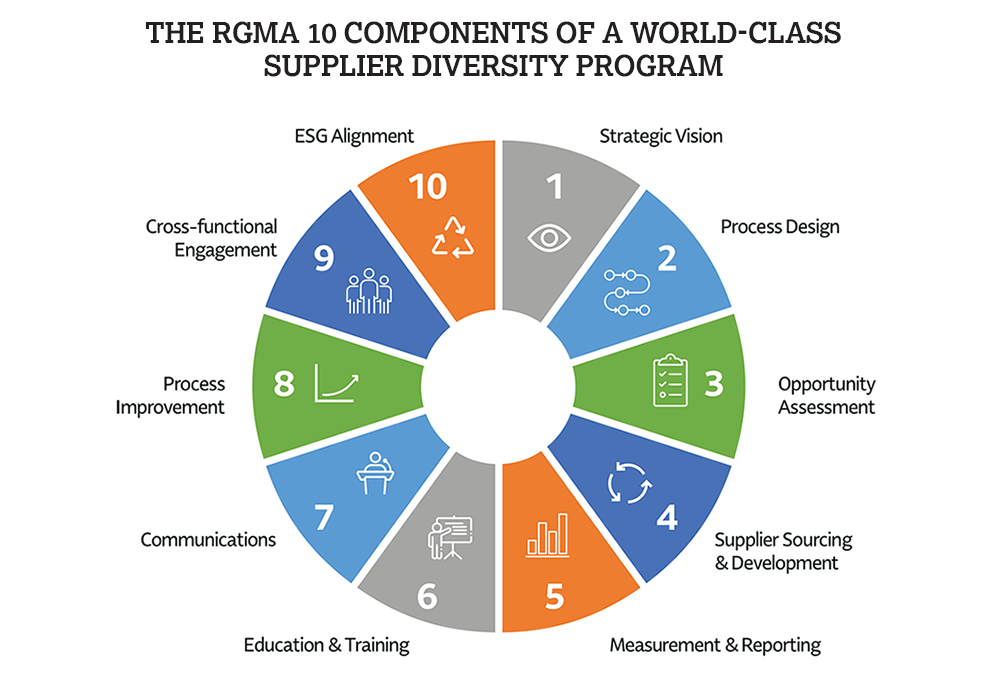By: Cynthia Brazzel, Senior Director, Member Relations and Advocacy (Western Region), FMI

Supplier diversity programs have become increasingly vital for promoting economic growth, creating opportunities for underrepresented businesses and fostering inclusivity. Implementing a supplier diversity program allows grocers and food manufacturers to drive business, improve customer choices, enhance brand reputation, reflect their community and demonstrate corporate social responsibility. Embracing supplier diversity is a strategic business decision and a step towards fostering a more inclusive and equitable society.
A supplier diversity program can be transformational in various aspects, including economic, cultural, market, supply chain and customer dimensions. By embracing diversity and inclusivity, a grocer realizes tangible business benefits and contributes to a broader transformational impact that fosters positive change throughout the food supply chain, ultimately to the consumer's at-shelf experience.
From a shopper's perspective, FMI's recent U.S. Grocery Shopper Trends report revealed that shoppers are employing a wide range of filters to define good value. The meaning of "good value" is becoming more complex as consumers navigate grocery aisles. Having a choice among brands is part of the shoppers' new mindset on relevance.
Supplier diversity programs provide access to a pool of talented entrepreneurs and business owners who may offer unique perspectives and expertise. Diverse suppliers bring fresh ideas, cultural insights, and specialized skills that can enhance a grocer's operations and competitiveness.
The FMI Supplier Diversity Committee teamed up with RGMA, a consultancy specializing in supplier diversity, that identified ten key components essential for developing a world-class supplier diversity program. These were applied in the FMI Supplier Diversity Next/Best Practices Guide. These components provide a comprehensive framework for food retailers and manufacturers to establish a robust and effective supplier diversity program.

By incorporating these ten RGMA components, grocery retailers and manufacturers can establish a world-class supplier diversity program that cultivates a thriving supplier business ecosystem. Grocery retailers are in a position to make a positive impact in their communities while driving innovation and choice for their customers.
James Harris, Senior Director, Diversity & Inclusion & Supplier Diversity, H-E-B, and Chair, FMI Supplier Diversity Committee, shared that "The FMI Supplier Diversity Committee has appropriately named the third white paper: FMI Supplier Diversity Next/Best Practices Guide." He adds "We created the resource to show how supplier diversity is used to gain market share, sales, profits and commitment to localization."
The new guide is written from the lens of retailers, wholesalers, and consumer package goods companies, regardless of the maturity of their supplier diversity program.
 Industry Topics address your specific area of expertise with resources, reports, events and more.
Industry Topics address your specific area of expertise with resources, reports, events and more.
 Our Research covers consumer behavior and retail operation benchmarks so you can make informed business decisions.
Our Research covers consumer behavior and retail operation benchmarks so you can make informed business decisions.
 Events and Education including online and in-person help you advance your food retail career.
Events and Education including online and in-person help you advance your food retail career.
 Food Safety training, resources and guidance that help you create a company food safety culture.
Food Safety training, resources and guidance that help you create a company food safety culture.
 Government Affairs work — federal and state — on the latest food industry policy, regulatory and legislative issues.
Government Affairs work — federal and state — on the latest food industry policy, regulatory and legislative issues.
 Get Involved. From industry awards to newsletters and committees, these resources help you take advantage of your membership.
Get Involved. From industry awards to newsletters and committees, these resources help you take advantage of your membership.


 Best practices, guidance documents, infographics, signage and more for the food industry on the COVID-19 pandemic.
Best practices, guidance documents, infographics, signage and more for the food industry on the COVID-19 pandemic.
